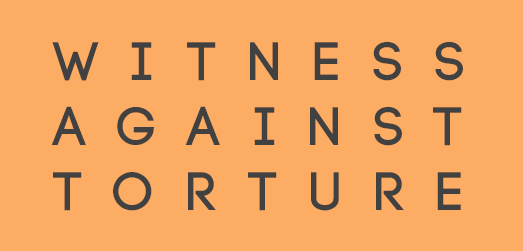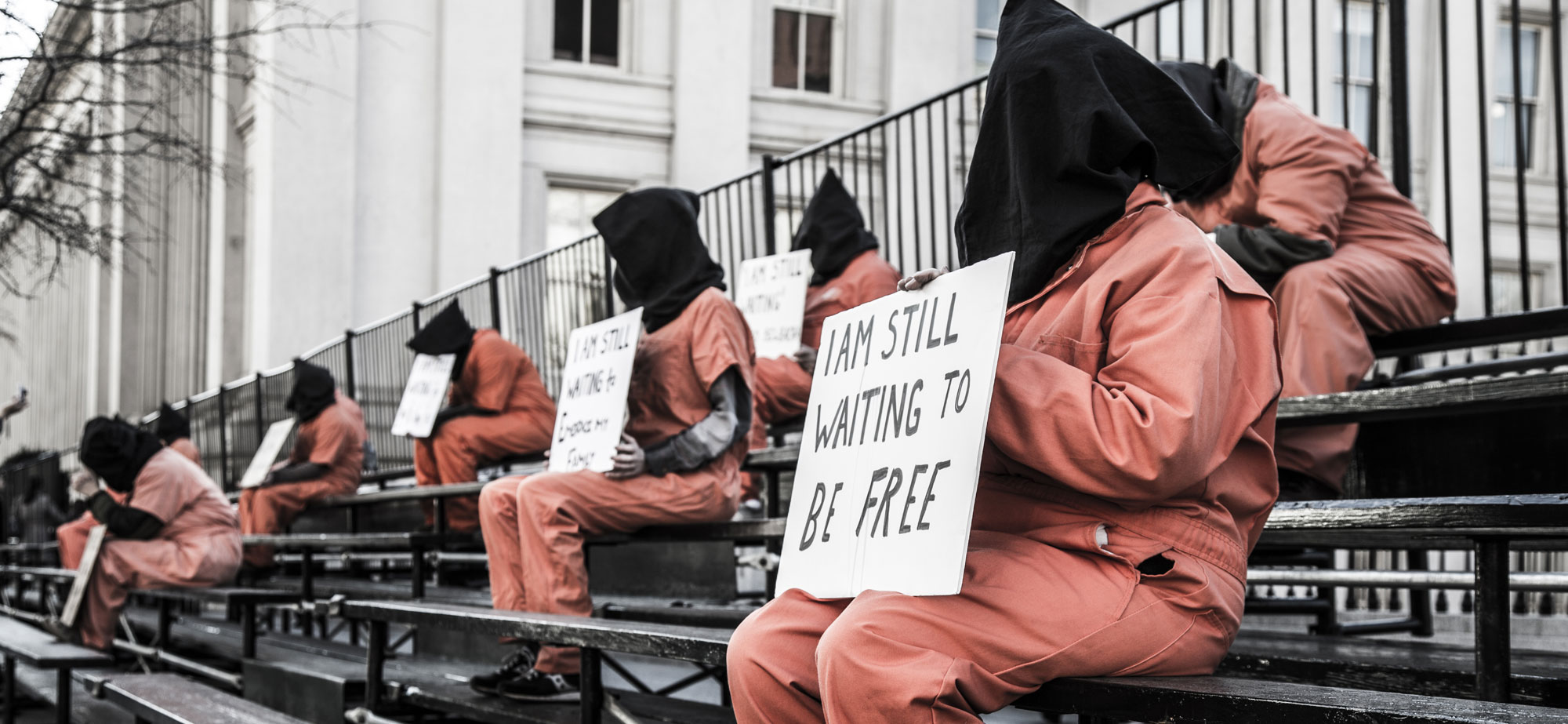From the Archive
Hunger Strike Solidarity Fast: Day 6
Guantánamo prisoner hunger strike day 51
Just as the heart beats in the darkness of the body,
so I, despite this cage, continue to beat with life.Those who have no courage or honor consider themselves free, but they are slaves.
I am flying on the wings of thought,
And so, even in this cage, I know a greater freedom.– Shaikh Abdurraheem Muslim Dost
A Pakistani poet, three years in Guantanamo, released and subsequently disappeared by Pakistani intelligence***
“Tell my family if I die to forgive me.”
– Abd al-Wahab
33-year-old Yemeni hunger striker, at Guantanamo since 2002
Fasting seems to be a mess of contradictions. We can be at once weak and energized, muddled and focused, hungry and satisfied. Our bodies hold these opposites in tension just as our spirits hold the depths of despair alongside the irrepressible rays of hope. I invite you as you read the reflections below, from Afghanistan and Virginia, New York and the U.K., to stand in awe of the beauty and exaltedness we are capable of in this world, dark as it is.
Guantanamo Fast in Afghanistan
Afghan Peace Volunteers
On the 28th of March 2013, the Afghan Peace Volunteers had a symbolic, one-day fast in solidarity with the hunger-strike Guantanamo prisoners, and with the peace activists of Witness Against Torture, not with the expectation to change any circumstances but to share the prisoners’ pain and to change themselves.
“I felt today that the feelings humans have for one another have not died.” Mustafa
“I fasted because I wanted to share their pain in a tiny way.” Khamad
“As I was giving my room a new coat of paint, I knew that the prisoners at Guantanamo are not free to paint their cells.” Abdulhai
“I felt that no one should have to go hungry.” Zekerullah
“I did this today for people who are complete strangers to me, but who are as human as me.” Nao Rozi
“Why should people have to suffer and experience torture even if they were guilty?” Barath Khan
“Even though ‘terrorists’ may be my ‘enemies’, I chose to fast today because I hate suffering experienced by anyone, even by those who may be my ‘enemies’.” Farhad
“I fasted with them even though they have no news of my solidarity or news from any part the world.” Raz Mohammad
“The discomfort I had for one day of fasting in solidarity made me think of how natural it would be for a human being to lose all hope after 11 years of doubt and suffering in a Guantanamo cell.”
“It’s sad that some people may think that the ‘terrible’ Guantanamo prisoners are just trying to be difficult by fasting. It indicates that our world is not only willing to condemn with supposedly ‘fair’ trials, we are now willing to condemn a human being with no trial at all.” Hakim
Reflection from the road
Kathy Kelly
On day 50 of the Guantanamo hunger strike and day 6 of a Witness Against Torture fast in solidarity with prisoners in Guantanamo, I’m on a bus traveling a mountain highway in Virginia. Spring colors, muted yet certain, emerge across fields and valleys. Distant blue peaks shadow farms where cows and horses graze. The scenery is picturesque and pastoral. A week ago, aboard a train to West Virginia, I stared at towns marked by a sad, strong contrast. The train passed through Appalachian towns. Collapsed houses, abandoned lots and blighted neighborhoods reminded me of war zones.
Dizzying inequalities persist in the U.S., where we somehow tolerate a war against the most impoverished people even as we wage multiple wars of choice beyond our borders.
Peace activists in Charlottesville invited me to stop in their city on my way home to Chicago. They arranged a presentation about effects of war on people in other lands. Because today is Good Friday in the Catholic faith, some of will gather before the Charlottesville Federal Building to observe the traditional stations of the cross, remembering the cross bearers in our world through the lens of gospel narratives about Jesus’ crucifixion.
Nancy Gowen and Bill Streit will meet me, carrying an orange jumpsuit and black hood to help us remember prisoners in Guantanamo. Among dozens of hunger strikers there, three have been hospitalized and at least eight are being force fed. The prisoners are protesting indefinite detention, many without charge, as well as disrespect for their holy book, The Quran. They have tried desperately to reach beyond the cruel confinement in Guantanamo. Lawyers allowed to meet with the men share poems, correspondence, and occasional photos of art work ingeniously fashioned from scraps and refuse.
Trapped, isolated and desperate, these men raise their lament yet speak of love.
The lament and love are echoed in Afghanistan where Afghan Peace Volunteers spent a day fasting in solidarity with the prisoners in Guantanamo. When we first met Ali, a young Afghan Peace Volunteer, he asked why U.S. people think Afghan people are animals. “What made you think that?” we asked him. “Why else,” he asked, “would they bomb us?”
And yet these young people send another question, beyond their isolation, “Why not love?”
Cries of lament and love echo though mountain ranges, plains, valleys and even prisons in a war-weary planet. Long ago gospel writers presented Jesus’ lament on the cross, “My God, my God, why have you forsaken me?” Jesus’ final utterance, we’re told, is this: “Into thy hands I commend my spirit.”
We’ll stretch out our hands in front of the Charlottesville Federal Building, bearing the jumpsuit and hood, the banners and photos to remind us of sinful wars. The hunger and yearning of men in Guantanamo, beckons us to stretch out our hands, imagining linkage with kindred spirits worldwide, and to commit to liberation from the chains that bind us to triple evils of racism, poverty and war.
On the Sixth Day of a Fast in Solidarity with the Hunger Strikers at Guantanamo Prison, March 29, 2013
Christopher Hirschmann Brandt
After five days’ fasting,
why am I not hungry?
I’d like to say it’s because
I refuse to be, my hunger
so much less than my
brothers’ in prison,
but
the truth is I’ve eaten
so much and so well
that I have more than
enough as a cushion –
mine
is a comfortable hunger,
not much of a sacrifice.
In many ways I gain from
fasting.
Still, small as it is
I offer my hunger to all
my brothers, held without
charge or reason at Gitmo,
not forgetting Mumia and
Peltier and all the others
unjustly caged.
Though
I cannot break the bars or
open the prison doors
these words perhaps
can reach through the
prison walls to say,
you are not alone.
Caged birds do not fly
Geraldine Cowan
Caged birds do not fly.
Cruel bars tightly surround
holding them in
while clouds drift by
on empty winds.
Caged birds do not sing.
Cells of torment keep them
joyless, still, lonely, waiting
for the end
In my dreams I see them still
soaring across the heavens
and hear them singing
high up in city trees.
Then I somehow know it, deep within me;
the dull men who capture them
can’t control their minds
can not delete their stories
can never rub their memories from
the book of time.
Too late! Too late!
They have already written
Upon my soul
etching indelible notes
that will not fade away;
melodies to pass on down through
my children’s children’s children,
who’ll live their own lives by the dreams
of free birds flying.
Links for further reading
Guantánamo’s Hunger Strike, by the Numbers — The New Yorker
Guatanamo hunger strikers ready for death – lawyer — Agence France-Presse
Guantanamo guard commander defends prison water — Miami Herald
Red Cross: Gitmo ‘tensions and anguish’ related to the lack of ‘clear legal framework’ — RT.com
Guantánamo Widow — CounterPunch.org
The Guantanamo Diet, written by Johina Aamer — CagePrisoners.com



Join us on social media